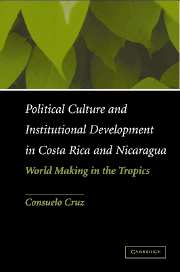 Political Culture and Institutional Development in Costa Rica and Nicaragua
Political Culture and Institutional Development in Costa Rica and Nicaragua Book contents
- Frontmatter
- Contents
- Acknowledgments
- List of Abbreviations
- Chronology
- Political Culture and Institutional Development in Costa Rica and Nicaragua
- Introduction
- 1 Theoretical Overview
- 2 Manichean Identities and Normative Scheming: Origins
- 3 Orphans of Empire: Constructing National Identities
- 4 Postcolonial Paths: Rhetorical Strategies and Frames
- 5 Costa Rica: Possibility Mongers
- 6 Nicaragua: Hybrid Arbitration
- 7 Tropical Histories: Paradise and Hell on Earth
- 8 Transition: Familiar Novelties
- Conclusion
- Index
1 - Theoretical Overview
Published online by Cambridge University Press: 20 August 2009
- Frontmatter
- Contents
- Acknowledgments
- List of Abbreviations
- Chronology
- Political Culture and Institutional Development in Costa Rica and Nicaragua
- Introduction
- 1 Theoretical Overview
- 2 Manichean Identities and Normative Scheming: Origins
- 3 Orphans of Empire: Constructing National Identities
- 4 Postcolonial Paths: Rhetorical Strategies and Frames
- 5 Costa Rica: Possibility Mongers
- 6 Nicaragua: Hybrid Arbitration
- 7 Tropical Histories: Paradise and Hell on Earth
- 8 Transition: Familiar Novelties
- Conclusion
- Index
Summary
Democracy thrives in social patterns that display certain characteristics and it might well be doubted whether there is any sense in asking how it would fare in others that lack those characteristics – or how the people in those patterns would fare with it.
–Joseph A. SchumpeterThere are polities in which even the keenest competitors agree on a basic understanding of politics as both the play of divergent interests and the forging of shared norms. And then there are polities in which even allies come to see politics as the machinations of master players and the power grabs of hostile rivals for whom legitimacy is no more than a cloak for plots and scrambles. Intuition tells us that while the former view may be conducive to a democratic regime of arbitration, the latter is surely detrimental.
But intuition notwithstanding, at the end of the Cold War, an old debate about democracy's universal reach became new again. In this debate, some argued that democracy was now the “exclusive claimant to set the standard for legitimate political authority.” Others countered that democracy's victory might turn out to be more fleeting than conclusive, and that the equivalence of democracy and modernity might turn out to be no more than an alarmingly “flimsy” notion.
We had been there before. This was not the first time we had heard proclamations of democracy's superior strength.
- Type
- Chapter
- Information
- Political Culture and Institutional Development in Costa Rica and NicaraguaWorld Making in the Tropics, pp. 19 - 45Publisher: Cambridge University PressPrint publication year: 2005
